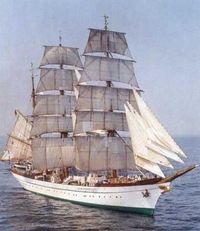The Camsell Mtns
Lucky we are with the weather...
Big Clouds but no rain
Working on the Panasonic Toughbook is not a problem, even in bright sunlight...
Best Computer I ever had !
The Camsell Mountains
ORCA at Wrigley
Fort Alexander, a trading post operated by the Northwest Trading Company from 1817 to 1821, was located 3.4 km from the Willowlake and Mackenzie Rivers. When the post closed, the Slavey Dene settled at Old Fort Island, an area 32 km north of the present site of Wrigley.
A Hudson Bay Company trading post was established in 1870. Population figures from the era are estimated at 300.
Between 1900 and 1905, 101 Dene died of famine and tuberculosis, and many moved to Fort Wrigley where the Slavey continued their nomadic lifestyle.
A power plant, school and teacher’s residence were built in the late-1950’s. The population increased to 128 by 1960. In 1965, due to wet ground and overall poor living conditions, the settlement moved to Hodgson Creek, the present site of Wrigley.
Hodgson Creek had the advantage of having had a well-maintained wartime airstrip constructed by the U.S. military for the Canol Project, making accessibility to the new settlement much easier. The Hudson Bay Company store, warehouse, the school, and the teacher's residence were moved by barge down the Mackenzie River to the new site in 1965, joining the fifteen new houses which had been built that year.
A traditional hunting and trapping lifestyle continues. The main economic activities in the area are hunting, trapping, and fishing. Local business includes building contracting, general retail, food sales, hotels, and restaurants.
A traditional name for the community is ‘Pedzeh Ki’, meaning ‘clay place’.
Getting gas at Wrigley
Church in Wrigley
Fire Ceremony
The feeding of the fire. This is a ceremony to give thanks, and to pray to the Creator and those who have passed away. Food and tobacco offerings were thrown into the fire and many prayers were made.
Drummer in Wrigley
For centuries, the beating of the drum has signalled the gathering. The drum in the North, is heard especially in celebration of special occasions. Singers sitor stand in a circle, while dancers swirl about to the beat of the pulsing drum. Today, the drum dance is still practiced in several communities and is always a unique treat for visitors.
Orca in the morning light
Next: Mackenzie River 3
Only those who risk going too far, will discover how far they can go!
Expedition in USA, Alaska & Canada, Scandinavia with folding boat, motorboat, catamaran, motorcycle, off-road vehicle, bicycle ...



















